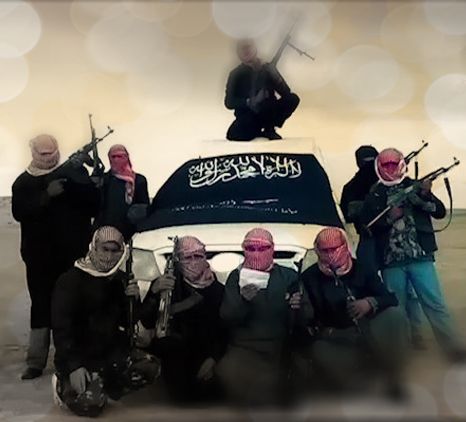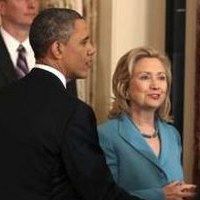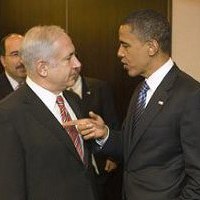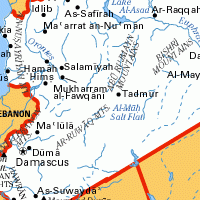![]()
Mon, Jan 14, 2013 | MEForum | by Gary C. Gambill
Originally published in The National Interest.

Jabhat al-Nusra is affiliated with Al-Qaida and the only Syrian rebel group that uses the same Web forum as Al-Qaida leader Ayman al-Zawahiri. Jabhat al-Nusrah li-Ahl al-Sham means “The Support Front for the People of Syria” and was designated by the United States as a terrorist organisation in December 2012.
As the Syrian civil war grows nastier and nastier, there is a growing consensus among mainstream Western policy analysts that the United States can best combat the growth of jihadist groups battling Syrian president Bashar al-Assad by patronizing a more respectable coterie of rebels fighting alongside them. While there may be some reasonable grounds for considering U.S. intervention in the conflict, this isn’t one of them.
According to the emerging conventional wisdom, the jihadist surge is fueled by the international community’s failure to support the predominantly Sunni Arab Syrian population’s fight against Assad’s Iranian-backed, Alawite-dominated regime. While Western governments have been unwilling to intervene militarily or provide weapons, the global Sunni Salafi-jihadist movement has poured money, men and material into the country, enabling its leaders to win support “from a population that would otherwise ignore them.”
Interventionists argue that American sponsorship of carefully vetted rebel units will counter these effects by bringing the civil war to an end sooner, closing the resource gap between moderates and extremists in the eventually-to-be victorious Sunni Arab opposition, and bolstering U.S. leverage over the successor regime.
To be sure, expediting an end to the conflict and the restoration of a functioning unitary state would do much to solve the problem. Jihadists surge wherever weakened state institutions in the Islamic world provide opportunities to organize, recruit followers, or kill perceived unbelievers. Conditions in Syria, where a majority Sunni Muslim population is being brutalized daily by a secular non-Sunni dictatorship that can’t control its own territory or borders, have made it an extremely permissive environment for Islamists.
But even if an American infusion of arms into the Syrian arena could “ensure the collapse of the Assad regime in weeks,” as some interventionists implausibly maintain, it wouldn’t necessarily bring a “faster resolution to the fighting.” Many Alawites are sure to fight on in the hinterlands of northwestern Syria so long as Iran is willing to supply them, while the country’s Kurdish minority won’t be eager to relinquish control of its remote enclaves to the likes of those now leading the rebel effort. Christian militias in Aleppo may not disband quietly. The rebels may turn on each other. Chronic ethno-sectarian and factional conflict could drag on for years.
Syria hawks maintain that if the United States arms and finances combatants, it will ameliorate this rocky transition by ensuring that “weapons go to those advocating a non-sectarian, decent political system for Syria and are denied to those seeking a sectarian outcome.” Yet even if such outward distinctions can be taken at face value, increasing the material resources available to “moderates” won’t make less resources available to Al-Qaeda affiliates (and might even free up their resources for more nefarious aims).
Those who claim otherwise are assuming that Saudi Arabia, Qatar, and other Arab Gulf monarchies will end their covert support for jihadist groups if Washington helps pacify Syria. But they have little incentive to support a secular-democratic political model that might inspire their own subjects to demand freedom, and still less to take action that might threaten the political quietism of Islamists at home. A large U.S. footprint in Syria won’t change these considerations and may actually discourage more responsible behavior among these Middle Eastern kingdoms — they could go on doing what they’re doing without worrying that Al-Qaeda will take over the country.
In any event, resources aren’t the only cause of the Islamist surge. Though most Syrian Sunnis do not embrace the jihadist message, the messengers are popular because they have proven themselves bolder and braver than their not-quite-so-god-fearing counterparts. While Jabhat al-Nusra comprises less than 10 percent of the fighters loosely organized under the Free Syrian Army (FSA) banner, moderate FSA commanders estimate that members of the jihadist group account for a majority of those killed and wounded in recent months, in large part from charging heavily defended regime outposts. They have also proven themselves more capable of delivering public services and combating petty crime in areas under their control, and less prone to murderous internal feuds. Even if U.S.-backed groups managed to gain preeminence on the battlefield, it is naïve to expect that they could be persuaded to square off against those who have played such a celebrated role in bringing the Assad regime to its knees.
Unfortunately, there is little the United States can do to counteract the glaring Islamization of rebel ranks (and accompanying Alawite retrenchment) in Syria. But what little it can and must do is very simple: browbeat Arab governments into cutting off the regional support networks of those who preach sectarian hatred while keeping distance from a rebellion that is steadily abandoning the moral high ground.
Gary C. Gambill is an associate fellow at the Philadelphia-based Middle East Forum.



 RSS
RSS










Latest Comments
Hello Mike, Thank you for your positive feedback to the article. I felt there wasn’t too much critical analysis of ...
Thanks for this considered and well constructed article. A follow up article on the manner in which the editorial contro...
THE CLUELESSNESS OF CLAIMING THAT OBAMA'S MIDDLE EAST POLICIES WERE A FAILURE CANNOT BE FURTHER FROM THE TRUTH, WHAT THE...
As long as Obama is the president of the usa do not trust the us government......
Thank you for an good read....